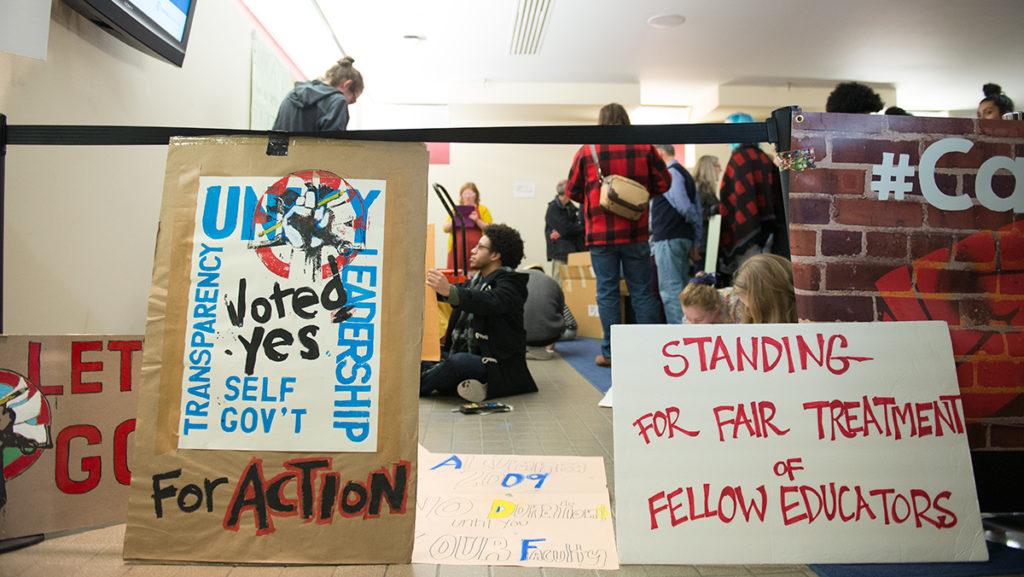Behind velvet ropes in the North Foyer of the Campus Center, dozens of demonstrators rallied in support of contingent faculty as the Ithaca College Board of Trustees held its official IC 20/20 cocktail party in the Emerson Suites on March 2.
The demonstration was held in response to a letter the contingent faculty unions received March 1 from the Office of Public Safety and Emergency Management, warning them of legal action if they continued to violate the College Rules for Maintenance of Public Order by protesting at the entrance of the college.
The cocktail reception in the Emerson Suites was organized to acknowledge the end of the IC 20/20 strategic plan, which concluded almost four years early to create space for the next college president to produce their own college-wide strategic plan.
The demonstrators hosted a mock cocktail party — with mostly just pizza and soda — which senior Taylor Ford said was a symbolic gesture aimed at the board members attending the official cocktail party next door. Many demonstrators created posters that they hung in the hallway for board members to see when the celebration was over.
Ford, president of IC Students for Labor Action, said the union demonstrators wanted to get the board’s attention after having been turned down for a meeting with them. David Maley, senior associate director of media and community relations, said that the board is not in charge of contract negotiations.
“As far as the contract negotiations go, the board is not involved in that,” Maley said. “The college has a bargaining team. The unions have a bargaining team. Contract negotiations take place at the bargaining table.”
Bargaining negotiation meetings are currently scheduled to take place again on March 8 and 15. Many contingent faculty members have said they feel dissatisfied with the lack of change coming out of the negotiation process.
Many of those gathered at the demonstration insisted that they were gatherers, not protesters — language they used to push back against the letter the unions received. Some of the faculty in attendance said they were a little intimidated at first after receiving the letter. However, Sarah Grunberg, contingent full-time instructor in the Department of Sociology, said the letter did not make her afraid at all.
“I wasn’t fearful because I know that we have strong support and I understand that that letter came from a place of fear,” she said. “Unfortunately, it was a terrible move on their part because it only drives more people to get involved.”
Tom Schneller, part-time lecturer in the Department of Music Theory, History, and Composition, said he felt the letter depicted an inaccurate description of the protests on Feb. 24.
“I’m on the bargaining committee, so I’ve been involved with the union since its very inception and I’ve seen it grow from a small group of people to this wonderful gliding, dynamic force on campus,” he said. “We’ve started to realize that there’s a kind of game that’s going on — that the administration is not really serious and committed about making substantial improvements to our conditions.”
Maley said Public Safety is not trying to inhibit students’ and faculty’s right to protest on campus. Instead, he said the college wants to ensure that protesters do not disrupt classes or threaten public safety.
“Freedom of speech and freedom of assembly are certainly hallmarks of what the campus stands for, but what is prohibited is disruption of college activity,” he said.
Maley said one of the concerns Public Safety had was that a crowd of protesters crossed Route 96B highway on a red light during the protest held Feb. 24. He said protesters did not abide by requests made by Public Safety officers at the protest, which prompted the letter.
Most of the demonstrators were students, including members of the Students for Labor Action and IC Progressives clubs on campus. Ford said he believed supporting teachers was in the best interests of students.
“Our teachers’ working conditions are our learning conditions,” he said. “They are not compensated fairly and right now are having problems with their jobs that is affecting our learning. Also they are our friends, people that we have relationships with and people that we care about.”
Most of those in attendance cleared out after two and a half hours. Some stayed late hoping to confront a few board members as they left the IC 20/20 celebration. One of the last professors in attendance was John Burger, lecturer in the Department of Health Promotion and Physical Education. He described the demonstrations made by the contingent faculty unions as a force for unity.
“Before this I didn’t know many of my fellow part-timers because I came here and I went and I left,” he said. “But now I have made a lot of new friends. So it’s a paradoxical effect. The more of this goes on, the more the college actually is coming together.”








